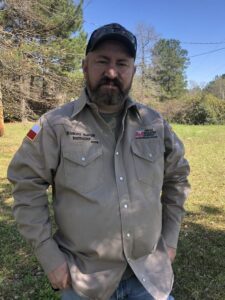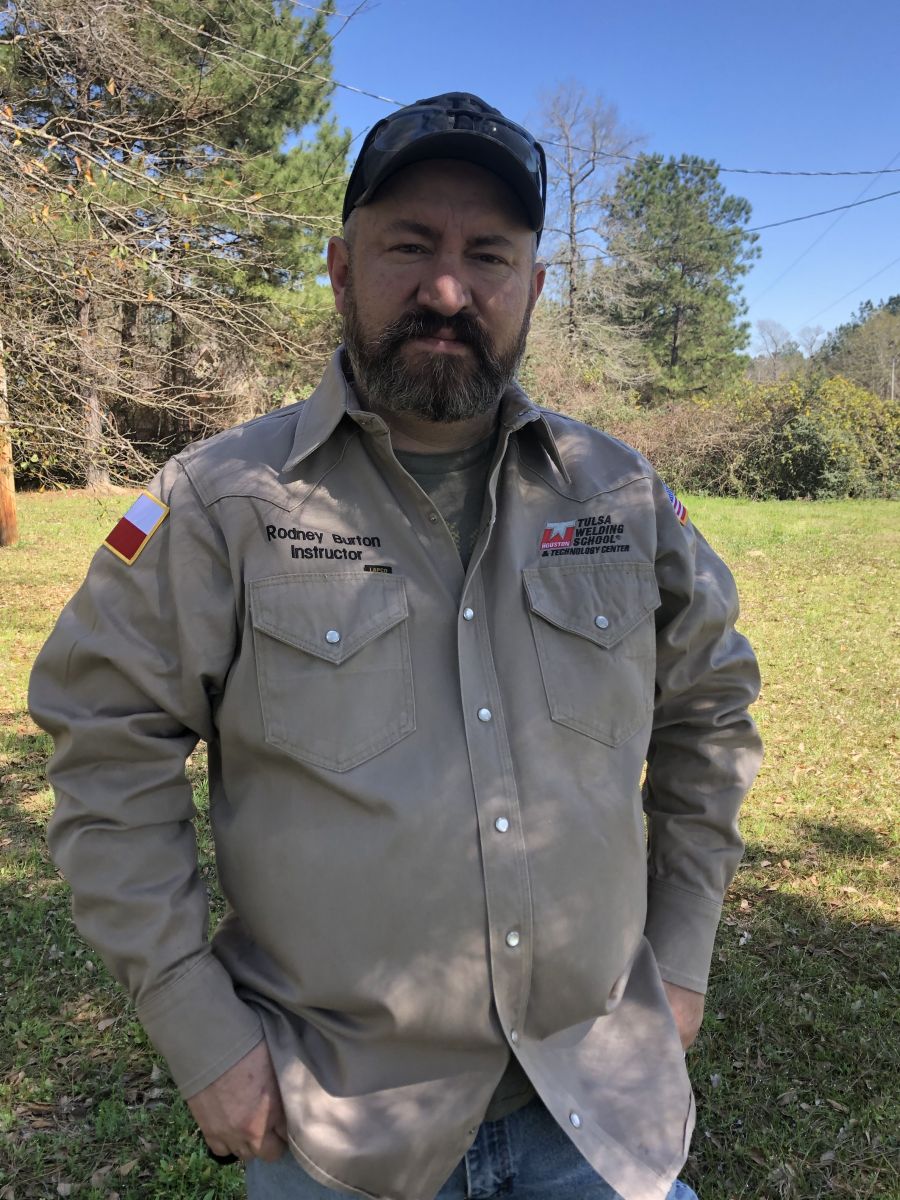TWS is a Great Training Option for Everyone
Learn more about how we can prepare you to advance your career.
Rodney, 44, born & raised in Cut and Shoot, Texas, is a welding instructor at the Tulsa Welding School & Technology Center in Houston. Rodney started teaching at TWSTC in January 2020. He currently teaches Structural Welding to the afternoon and evening shifts, which is Phase 2 of the Welding Specialist program in Houston.
Thanks for your time, Rodney. How long have you been welding?
I’ve been welding pretty much all my life. We had a small farm when I was a kid, and I used to help my great-grandfather. I’d help him weld and fix pipe fences, cattle guards, and tractor parts. Then I took Ag Metal Fab 1, 2 & 3, all through high school.
Tell us about your welding career.
Have You Considered a Career in the Skilled Trades?
Fill out the form to recieve a no obligation info packet.
My first welding job after high school was building gooseneck trailers. After that, I went to work for a rig welder for a while, then it went from there. I worked in metal shops building parts, tools and equipment for the oil fields for several years. Then I went out into the oil fields as a rig welder. I worked out there for many years on compressor stations, load out stations, stuff like that. I would bounce back and forth from stuff like that to refineries and chemical plants. My main field was pipe welding. That’s what I’ve been doing most of my life.
Explain what you mean by a rig welder for those who don’t know?
A rig welder is a person who has a truck rigged out with their own welding machine, leads, and tools. They basically come out to a job site fully equipped to go to work, using their own equipment. I would sign on for a company for a certain amount of time and build the project. Then once the project is completed, I’d shake hands and move on to the next project. There’s a lot of 1099 work (subcontract) out there, too, but most of the time I signed on with the company as an employee.
As a kid what did you want to be when you grew up?
As a kid, all I ever wanted to be was either a wildlife biologist or a game warden.

New: Industrial Maintenance
Learn About Our New Advanced Industrial Maintenance Program
Tulsa Welding School is proud to announce our newest program offering available at our Houston & Dallas Metro Campuses – Advanced Industrial Maintenance Technology! Learn the skills you need to take on the industries of manufacturing, distribution, energy production and facility maintenance in as few as 7 months.
Where did that idea come from?
I grew up with my great-grandparents. They raised me my whole life. To me they were my parents. One of the things my great-grandfather and I did together was hunt. We never missed deer hunting season, and that time meant a lot to me. I wanted to pursue that and turn it into a career. But as I got older, I found that I really enjoyed metal fabrication, so I pursued that instead.
Did you go to welding school?
No, to be honest I didn’t know there were welding schools out there to help you make a career of it. Other than my little bit of schooling to learn the processes, I didn’t really know much when I started. It was hard because I went into it with a huge lack of knowledge. I had to learn everything on my own, and that’s a hard way to learn. Back then, a lot of welders didn’t want to teach you a thing because they didn’t want to lose their jobs. It was a different generation. It took me a number of years to get it down.
What made you go into teaching?
During my 20 years in the field I’ve probably taught 50 to 100 helpers how to weld. I spent a lot of those years traveling, always on the road, maybe out of state, while my wife was at home raising our kids. I stayed out there because I wanted to make sure their lives were good and that their schooling was paid for. Now my kids are grown, so last year my wife and I decided I didn’t want to travel anymore. I wanted to be home. I saw an ad for Tulsa Welding School and I just fell in love with the idea.

What do you like best about teaching?
Taking somebody who has never messed with welding before, who is having trouble with it, and getting them started. Then seeing the expression on their face when we work through a problem and they weld a nice bead. That look of accomplishment on their face is the best thing for me!
Tell me something most people don’t know about you.
I’m pretty much an open book. I’ve always been into hunting and fishing. I’m really into bush craft, like wilderness survival, things of that nature. I’m a real big Civil War buff. I love traditional archery and traditional weapons. I’m building an early 1800s percussion rifle at home right now.
If you could choose to have dinner with anyone, alive or dead, who would that be.
Davy Crockett. Along with the Civil War, I’m really into Texas history. I’d like to hear about his travels.
Tell us about your family.
My wife and I started dating our senior year of high school. We got married in 1995. We have two kids in their 20s. We are waiting on some grandkids. I believe my daughter and her husband are working on that!
If you weren’t a teacher and could do anything with your time, what would you do?
If I won the lottery, I’d buy some land and split it between a cattle ranch and a private hunting reserve.
You get an unexpected evening off. What would you do?
I would go home, pick up my wife, and go out for something to eat! My wife and I don’t get to go out very often, so that would be nice to spend some time with her.
What was your favorite part of the welding industry when you worked in the field?
I just enjoyed being in the oil fields welding pipe. I enjoyed being outside. Some people don’t like being out in the weather, but I’ve always enjoyed being out in nature.
What advice do you have for new students considering TWS?
I always ask students, on day one of the phase I teach, why do you want to be here? What do you want to get out of it? I ask because welding is one of the trades where you only get out what you put into it. It’s something you have to work at. The more you work at it, the better results you will see.
I know the first two phases are kind of tough, but as long as you stick with it, stay motivated, end each school session on a good note, you will succeed. I try not to let my students go home on a bad note. We get in the booth together and work it out. I try to get them to leave on a good note, so they have a positive frame of mind the next day.
Welding is repetition. The two biggest things in welding are getting a technique down and building up muscle memory. Once you get that technique, it’s all repetition. Just don’t give up. If you don’t stop trying, you’ll make it. The other thing I would say, once you get out into the field, find something in this trade you enjoy and stick with it. Welding can turn into an art form. Always try to make your next weld better than your last.
What was your favorite tool of the trade when you worked in the field?
My great-grandfather gave me something years ago, and I would use it quite often. You don’t see them much anymore, but it was a tape measure, one of the old wooden ones that you folded up. I can hardly read it now, it’s so worn. I found plenty of uses for it. It ended up being one of my favorite tools.
If you could tell anyone “thank you” for helping you become who you are today who would that be?
I would have to say my great-grandfather, Jack Lewis. I called him papa. He was a very fair man, but stern. He wasn’t the type to say he was proud of me or tell me he loved me. But he would stay on my butt 24 hours a day. From the time I moved out of the house to the day he died in 2009, he would call me every morning at 5 a.m. just to give me my daily butt-chewing. He wanted to make sure my day started right.
This blog has been labeled as archived as it may no longer contain the most up-to-date data. For a list of all current blog posts, please visit our blog homepage at https://www.tws.edu/blog/







